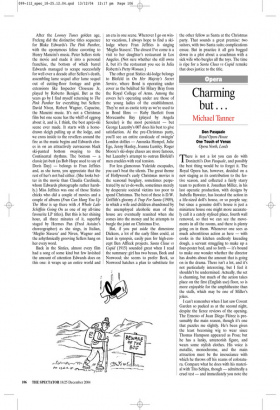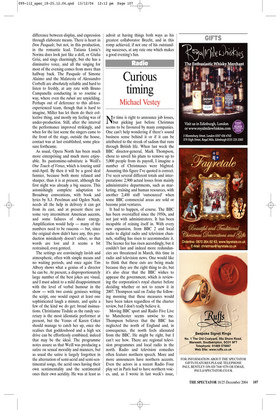Charming but . . .
Michael Tanner
Don Pasquale Royal Opera House One Touch of Venus Opera North, Leeds
There is not a lot you can do with Donizetti’s Don Pasquale, and possibly the best thing would be to forget it. The Royal Opera has, however, decided on a new staging as its contribution to the festive season, and collected a fairly starry team to perform it. Jonathan Miller, in his last operatic production, with designs by Isabella Bywater, has located the action in a life-sized doll’s house, or so people say; but since a genuine doll’s house is just a miniature house one might more accurately call it a cutely stylised place, fourth wall removed, so that we can see the movements in all the rooms, and there is plenty going on in them. Whenever one sees as much adventitious action as here — with cooks in the kitchen endlessly kneading dough, a servant struggling to make up a four-poster bed, and so forth — it’s bound to make one wonder whether the director has doubts about the amount that is going on in the drama. There isn’t a lot, and it’s not particularly interesting, but I feel it shouldn’t be undermined. Actually, the set is charming, but much of the action takes place on the first (English use) floor, so is more enjoyable for the amphitheatre than the stalls, which may be one of Miller’s jokes.
I can’t remember when I last saw Covent Garden so packed as at the second night, despite the fierce reviews of the opening. The Ernesto of Juan Diego Flórez is presumably the main reason, though it’s one that puzzles me slightly. He’s been given the least becoming wig to wear since Thomas Hampson appeared as Posa; but he has a lanky, untenorish figure, and wears some stylish clothes. His voice is metallic, monochrome, and the main attraction must be the insouciance with which he throws off his reams of coloratura. Compare what he does with his material with Tito Schipa, though — admittedly a cruel test — and immediately you note the difference between display, and expression through elaborate means. There is heart in Don Pasquale, but not, in this production, in the romantic lead. Tatiana Lisnic’s Norina does look just like a doll, or Giulia Grisi, and sings charmingly, but she has a diminutive voice, and all the singing for most of the evening comes from more than halfway back. The Pasquale of Simone Alaimo and the Malatesta of Alessandro Corbelli are absolutely reliable and hard to listen to freshly, at any rate with Bruno Campanella conducting in so routine a way, where even the rubati are unyielding. Perhaps out of deference to this all-tooexperienced team, though that is hard to imagine, Miller has let them do their collective thing, and mostly my feeling was of under-production. Still, after the interval the performance improved strikingly, and when for the last scene the singers came to the front of the stage, outside the house, contact was at last established, some pleasure forthcame.
As usual, Opera North has been much more enterprising and much more enjoyable. Its pantomime-substitute is Weill’s One Touch of Venus, which is touring until mid-April. By then it will be a good deal funnier, because both more relaxed and sharper, than it is at present, although the first night was already a big success. This astonishingly complete adaptation to Broadway conventions, with book and lyrics by S.J. Perelman and Ogden Nash, needs all the help in delivery it can get from its cast, and at present there are some very intermittent American accents, and some failures of sheer energy. Amplification would help — many of the numbers need to be raucous — but, since the original show didn’t have any, this production mistakenly doesn’t either, so that words are lost and it seems a bit restrained, even genteel.
The settings are convincingly lavish and atmospheric, often with simple means and no waiting periods, and once again Tim Albery shows what a genius of a director he can be. At present, a disproportionately large number of the best jokes are visual, and I must admit to a mild disappointment with the level of verbal humour in the show — with two comic geniuses writing the script, one would expect at least one sophisticated laugh a minute, and quite a few of the kind we do get: broad insinuations. Christianne Tisdale as the randy secretary is the most idiomatic performer at present, but the Venus of Karen Coker should manage to catch her up, once she realises that goddesshood and a high sex drive can be effortlessly combined, indeed that may be the ideal. The programme notes assure us that Weill was producing a satire on sexual morality and manners, but as usual the satire is largely forgotten in the alternation of semi-acrid and semi-sentimental songs, the acrid ones having their own sentimentality and the sentimental ones their own acridity. He was at least as adroit at having things both ways as his greatest collaborator Brecht, and in this romp achieved, if not one of his outstanding successes, at any rate one which makes a good evening’s fun.


















































































 Previous page
Previous page